Super Tuesday Results Decoded: A Ballotpedia Special Update

Navigate this page by clicking the tabs below:
The big picture
The Presidential Election
Navigate this section:
Former Secretary of State Hillary Clinton swept six southern states holding Democratic primary elections on March 1 by wide margins, carrying the critical African-American vote in Alabama, Arkansas, Georgia, Tennessee, Texas and Virginia. She capped off the evening by squeezing past Vermont Sen. Bernie Sanders in Massachusetts, a state that they both fought hard for. The size of her victories in the South was daunting, ranging from roughly 29 percentage points in Virginia to almost 70 percentage points in Alabama. According to the television networks’ exit polls, a representative sampling of voters as they left their precinct polling stations, Clinton won the African-American vote by margins of roughly 5 to 1 in Virginia to an incredible 18-to-1 margin Alabama. Put another way, she won every one of those states with no less than 83 percent support from African-Americans.
- See more analysis from senior staff writer Jim Barnes: Clinton's Super Tuesday
Billionaire developer Donald Trump extended his string of primary victories on Super Tuesday and tightened his grip on the Republican presidential nomination. But he was also nicked in a few states. The next two weeks will determine whether those cuts were serious or not. Trump won primaries across the South and New England: He carried Alabama, Arkansas, Georgia, Tennessee and Virginia, as well as Massachusetts and Vermont. But Texas Sen. Ted Cruz beat Trump in primaries in Oklahoma and his home state of Texas, as well as in the Alaska caucuses. Florida Sen. Marco Rubio won his first contest in the nominating race, the Minnesota GOP caucuses. Trump’s five victories in the southern primaries were driven by his strength in rural and smaller counties in those states. But at the same time, he consistently underperformed or lost in major metropolitan areas, pointing to a potential weakness going forward.
- See more analysis from senior staff writer Jim Barnes: Trump's Super Tuesday
Congressional Elections
All congressional incumbents who sought re-election won their primaries. The closest race involving an incumbent was in Texas’ 8th Congressional District, where incumbent Kevin Brady (R) narrowly avoided a runoff election by taking in 53.4 percent of the vote. He defeated Steve Toth, Craig McMichael and Andre Dean in the Republican primary and will face no opposition in the general election. There were only two congressional open seats up for election, and both seats will require a primary runoff to determine their parties’ nominees.
- Texas District 15
- In the race to fill the open seat left by the retirement of Ruben Hinojosa (D), both parties will be forced to hold a runoff election on May 24, 2016. Vicente Gonzalez and Juan Palacios Jr. advanced to the Democratic runoff with 42 and 19 percent of the vote, respectively. Tim Westley and Ruben Villarreal advanced to the Republican runoff with 45 and 32 percent of the vote, respectively.
- Texas District 19
- In the race to fill the open seat left by the retirement of Randy Neugebauer (R), Glen Robertson and Jodey Arrington defeated seven other candidates to advance to the Republican primary runoff on May 24, 2016. The race between Robertson and Arrington was very close, with Robertson taking 27.4 percent of the vote to Arrington’s 26.5 percent. The winner of the runoff will face no Democratic opposition in the general election.
State Elections
State courts
- Arkansas Supreme Court:
- Circuit Judge Dan Kemp defeated Supreme Court Associate Justice Courtney Goodson for the chief justice position. Satellite spending on TV ads for the nonpartisan race broke the state’s previous record; the conservative Judicial Crisis Network, critical of Goodson, alone spent over $600,000 on commercials.
- Circuit Judge Shawn A. Womack defeated attorney Clark W. Mason to fill the seat left vacant by the retirement of Associate Justice Paul Danielson.
- Texas Supreme Court: All three of the Republican incumbents running for re-election—Debra Lehrmann, Paul Green and Eva Guzman—beat their primary challengers and will face a Democratic opponent in November. Republicans currently hold each of the court’s nine seats; no Democrat has been elected to its bench since 1992.
State legislatures
- Arkansas State Legislature: With results for one race outstanding, all but two of the 10 incumbents facing primary competition won re-election. Arkansas, which has some of the country’s least competitive state legislative elections, is a Republican trifecta state.
- Texas State Legislature: Republican incumbents who faced conservative challengers did well Tuesday night: among others, Dan Flynn (District 2), Byron Cook (District 8), and Charlie Geren (District 99) all won re-election to their seats.
State executives
- Alabama Public Service Commission: Twinkle Andress Cavanaugh (R) was re-elected public service commissioner by defeating challenger and former commissioner Terry Dunn (R), who lost his re-election bid in 2014. She faces no Democratic competition in the November election. Alabama is one of 11 states that elect public service commissioners, and it currently has a Republican state government trifecta.
Statewide ballot measures
- Alabama’s Amendment 1, the sole statewide ballot measure on Tuesday’s ballot, was approved. District attorneys and clerks will now be included in the state’s public pension program, and some judges will be required to increase the amount they contribute to their pensions.
Local Elections
Elections for local judgeships were held across Arkansas, Tennessee and Texas. In Arkansas, four of the 18 seats were contested in the general election. In Tennessee, three of the 10 seats were contested in the Republican primary election. No Democratic candidates filed to run in any of the primary elections, so a Democratic primary election was not held. In Texas, 295 seats are up for election in 2016—259 seats for the Texas District Courts and 36 for the Texas County Courts. A total of 56 district court seats and 17 county court seats featured contested primary elections.
Elections for school boards in some of America’s largest school districts were held in Alabama, although both California and Tennessee each had a single district holding elections as well. In Alabama, 11 of the state’s largest 18 school districts held primary elections.
Charts
Delegate counts
Democratic nomination
Republican nomination
Turnout
Democratic turnout
Most of the Democratic primaries were not very competitive on Super Tuesday and predictably the turnout was far below previous high marks, which were almost all set in 2008. However, in Massachusetts, where both Clinton and Sanders ran a vigorous race, the turnout was not that far off the state’s 2008 Democratic presidential primary record. But in most of the southern states, where voters could cast ballots in either party’s primary, more were drawn to participate in the GOP contest.
| Super Tuesday Dem primary turnout by state | ||||
|---|---|---|---|---|
| State | Previous high | Year of high turnout | 2016 turnout | % Precincts reporting |
| Alabama | 536,656 | 2008 | 397,890 | 100% |
| Arkansas | 502,617 | 1992 | 213,317 | 95% |
| Georgia | 1,060,851 | 2008 | 753,562 | 99% |
| Massachusetts | 1,258,923 | 2008 | 1,165,848 | 96% |
| Oklahoma | 417,207 | 2008 | 335,554 | 100% |
| Tennessee | 624,764 | 2008 | 371,082 | 99% |
| Texas | 2,874,986 | 2008 | 1,341,125 | 91% |
| Vermont | 154,960 | 2008 | 130,487 | 97% |
| Virginia | 986,203 | 2008 | 783,986 | 100% |
In the two Democratic caucuses on Super Tuesday, which were competitive between Clinton and Sanders, turnout was relatively high. With more than 121,000 caucus-goers, a new record was set in Colorado in 2016.
| Super Tuesday Dem Caucus turnout by state | ||||
|---|---|---|---|---|
| State | Previous high | Year of high turnout | 2016 turnout | % Precincts reporting |
| Colorado | 120,411 | 2008 | 121,596 | 98% |
| Minnesota | 214,066 | 2008 | 185,314 | 86% |
Republican turnout
Turnout was a big story for Republicans on Super Tuesday. The GOP set records in eight of the nine states that held primaries. In some places, they smashed previous highs, like Arkansas, Texas and Virginia. Only in Vermont did Republicans fall short in setting a record.
In 2012, the turnout in the same nine primaries was 4,702,524. For 2016, an estimated 8,375,000 Republicans came to vote along with an estimated 5,830,000 Democratis.
| Super Tuesday GOP primary turnout by state | ||||
|---|---|---|---|---|
| State | Previous high | Year of high turnout | 2016 turnout | % Precincts reporting |
| Alabama | 622,084 | 2012 | 807,837 | 94% |
| Arkansas | 229.153 | 2008 | 395,446 | 95% |
| Georgia | 963,541 | 2008 | 1,283,201 | 98% |
| Massachusetts | 500,550 | 2008 | 596,703 | 95% |
| Oklahoma | 335,054 | 2008 | 459,542 | 100% |
| Tennessee | 554,573 | 2012 | 853,571 | 99% |
| Texas | 1,449,477 | 2012 | 2,460,714 | 80% |
| Vermont | 81,355 | 2000 | 58,572 | 95% |
| Virginia | 664,093 | 2000 | 1,025,252 | 99% |
The story was much the same in the GOP caucuses.
| Super Tuesday GOP Caucus turnout by state | ||||
|---|---|---|---|---|
| State | Previous high | Year of high turnout | 2016 turnout | % Precincts reporting |
| Minnesota | 62,828 | 2008 | 111,698 | 92% |
| Alaska | 13,219 | 2012 | 21,930 | 97% |
By state
Jump to state: Alabama, Alaska, American Samoa, California, Colorado, Georgia, Massachusetts, Minnesota, Oklahoma, Tennessee, Texas, Vermont, Virginia, Wyoming
Alabama
| Presidential primary | |
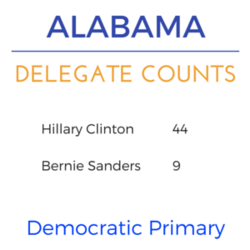 | Hillary Clinton won Alabama's Democratic primary. In 2008's primary, Hillary Clinton came in second with 42 percent. Barack Obama won the 2008 Alabama Democratic primary with 56 percent of the vote. A Monmouth University Poll taken days ahead of Super Tuesday in 2016 showed Clinton with a commanding 71 percent to 23 percent lead over Bernie Sanders. Exit polling shows that Clinton swept both men and women and all age groups except for 18-29. Bernie Sanders won the support of 55 percent of those voters. |
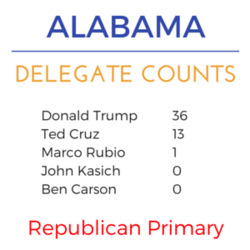 | Donald Trump won Alabama's Republican primary. In a poll conducted by Monmouth University February 25-28, 2016, Donald Trump had the support of 42 percent of likely Republican primary voters. Marco Rubio was second with just 19 percent. Exit polls show that Trump carried men and women and all age groups except 30-39. By a small margin, those voters supported Rubio, as did voters with postgraduate educations. Trump won the support of 57 percent of veterans and 45 percent of born-again or evangelical Christians. Seventy-eight percent of Republican voters polled described themselves as conservative, and Trump won the support of 45 percent of these voters. Just 22 percent of the Republican primary voters surveyed identified themselves as moderate or liberal, and Trump won 45 percent of their support as well. Ted Cruz won the support of 23 percent of conservatives; Rubio won 16 percent. |
Congress
U.S. House elections
- All seven House incumbents are seeking re-election in 2016. Three incumbents—Mo Brooks (R), Gary Palmer (R) and Terri Sewell (D)—did not face a primary challenger. Brooks will face Democratic challenger Will Boyd in the general election, and Palmer will face Democratic challenger David Putnam. Sewell is unopposed in the general election. The incumbents of Districts 1-4 also won their primaries, and details of their elections are listed below.
- District 1
- Incumbent Bradley Byrne (R) defeated businessman Dean Young. No Democratic candidates filed to run in 2016.
- District 2
- Incumbent Martha Roby (R) defeated Becky Gerritson and Robert Rogers. Nathan Mathis was uncontested in the Democratic primary.
- District 3
- Incumbent Mike Rogers (R) defeated former Phenix City Schools superintendent Larry DiChiara. Jesse Smith was uncontested in the Democratic primary.
- District 4
- Incumbent Robert Aderholt (R) defeated Phil Norris. No Democratic candidates filed to run in 2016.
- District 1
U.S. Senate election
- Incumbent Sen. Richard Shelby (R) faced four primary challengers. Shelby defeated John Martin, Shadrack McGill, Jonathan McConnell and Marcus Bowman.
- Two candidates faced off for the Democratic nomination. Charles Nana was defeated by Ron Crumpton.
State
Public Service Commission
- Incumbent Twinkle Andress Cavanaugh (R) defeated Terry Dunn (R), who served on the commission from 2011-2015.
Amendment 1
- Amendment 1 was approved by Alabama voters on March 1. District attorneys and clerks will now be included in the state’s public pension program. Judges will be required to increase the amount they contribute to their pensions and will be prevented from collecting a pension until the age of 62. Amendment 1 is the first measure on a statewide ballot in 2016; click here for more of Ballotpedia’s comprehensive coverage.
Local
School board primary elections were held in Alabama’s largest school districts.
- Autauga County School System
- District 3 incumbent Mark Hindman defeated Barb Mokrzycki in the Republican primary.
- Baldwin County Public Schools
- District 7 incumbent Shannon Cauley defeated Chris Francis in the Republican primary.
- Cullman County Schools
- District 1 incumbent Gene Sullins defeated Patrick Klein in the Republican primary.
- District 3 challenger Heath Allbright won the Republican primary, defeating Sam Benefield, Destry Stone and incumbent James Thompson, who received the least amount of votes.
- Elmore County Public Schools
- District 5 incumbent Larry Teel was defeated by Elmore County economic development director Leisa Finley in the Republican primary.
- Jefferson County Schools
- Place 1: Ronnie Dixon and Donna Pike defeated Samuel Staggs in the Republican primary, but neither received a majority of the vote. Watkins-Smith and Collins will advance to a primary runoff election on April 12, 2016. Incumbent Jennifer Parsons did not file for re-election.
- Madison County Schools
- District 4 incumbent David Vess was defeated by defense contractor Dave Weis in the Republican primary.
- District 5: Tyler McKinney defeated Shere Rucker in the Republican primary. Incumbent Jeff Anderson did not file for re-election.
- Mobile County Public Schools
- District 5 incumbent Bill Foster defeated Theresa Hubbard in the Republican primary.
- Montgomery Public Schools
- District 4 incumbent Mary Briers defeated challenger Michael Cheatham in the Democratic primary.
- In District 7, Arica Watkins-Smith and incumbent Roberta Collins defeated Phyllis Harvey-Hall in the Democratic primary, but neither received a majority of the vote. Watkins-Smith and Collins will advance to a primary runoff election on April 12, 2016.
- Shelby County Schools
- Place 1 incumbent Jane Hampton defeated challenger Ramona Piland Rice in the Republican primary.
- Tuscaloosa County School System
- District 6 incumbent Joe Boteler was defeated by Randy Smalley in the Republican primary.
- The general election for most districts will be November 8, 2016, although some districts may have elections on August 23, 2016. Overall, 12 of the state’s largest school districts will hold elections for 26 seats in 2016.
Alaska
| Presidential election | |
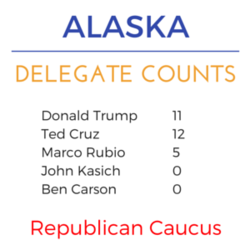 | Ted Cruz won the 2016 Alaska Republican caucuses. The race was the last contest to be called on Super Tuesday and proved to be one of the most competitive. Cruz defeated Donald Trump by only a few percentage points. With 95 percent of the results reported, Cruz led by just over 600 votes. |
American Samoa
| Presidential primary | |
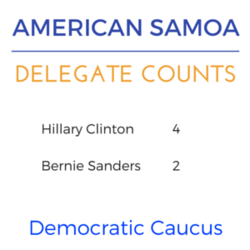 | Hillary Clinton won the territory's Democratic caucuses and four of the six pledged delegates. |
Arkansas
| Presidential primary | |
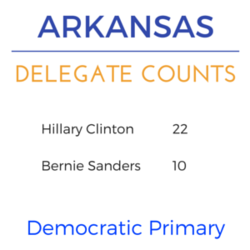 | Hillary Clinton won Arkansas' Democratic presidential primary with 66.3 percent of votes cast. Clinton was the first lady of Arkansas from 1983 to 1992. She had an overwhelming victory in Arkansas in the 2008 Democratic presidential primary, winning 69.7 percent of votes cast; Barack Obama won 26.6 percent. This year’s exit polls show that Clinton won the support of 72 percent of women and 78 percent of voters over age 45. Clinton had overwhelming support from black voters in Arkansas, winning 88 percent. |
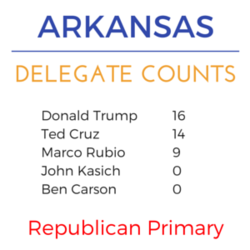 | Donald Trump won Arkansas' 2016 Republican primary. Exit polling conducted by CNN showed that Trump won 38 percent of voters who are not college graduates, while Ted Cruz and Marco Rubio split the college graduate vote with 30 percent each. Trump did well with both the state's wealthiest and least wealthy voters, winning the support of 38 percent of voters earning less than $50,000 and 33 percent of voters earning more than $100,000. Cruz outperformed Trump with voters in the $50,000 to $100,000 income range, winning 35 percent. Cruz topped Trump among Republicans; he won the support of 33 percent, while Trump won 31 percent. Trump topped Cruz among independents, winning 35 percent. Cruz had the support of 44 percent of very conservative voters. Trump fared better with somewhat conservative and moderate voters. |
Congress
U.S. House elections
- All four House incumbents (all Republican) are seeking re-election in 2016. Only French Hill (R), in the 2nd Congressional District, faced a primary challenger. Hill defeated Brock Olree in the GOP primary.
- Only one Democratic candidate, Dianne Curry, filed to run in any of the four House races. Curry is running in the 2nd Congressional District.
U.S. Senate election
- Sen. John Boozman (R) will seek re-election in 2016. He faced just one challenger, Curtis Coleman, in the Republican primary. Boozman defeated Coleman in the primary.
State
- Legislature: Arkansas, home to some of the country’s least competitive state legislative elections, held primary elections for the state House and state Senate. Arkansas is currently a Republican trifecta state.
- Only seven Democratic Party candidates are running in the Arkansas State Senate election, which is less than half of those who filed to run in 2010. Since Republicans are running unopposed in so many districts in the state Senate and state House, Democrats cannot regain control of the chambers. In an interview with Ballotpedia, H.L. Moody—communications director for the Democratic Party of Arkansas—said potential Democratic candidates are unable to capture donations, and some “don’t see a path to victory.” Without the numbers to win the state Senate, Moody said that the party’s goal was to “start building back where we can,” beginning with the House.
- Supreme Court: Two seats on the Arkansas State Supreme Court, made vacant by the retirements of Associate Justice Paul Danielson and Chief Justice Howard Brill, were up for election. Justices are elected to eight-year terms in nonpartisan elections.
- Circuit Judge John Dan Kemp defeated Supreme Court Associate Justice Courtney Goodson for the chief justice position. Satellite spending on TV ads broke the state’s previous record: $798,315 had been spent on commercials as of Feb 18. At least $532,030 of that came from the conservative Judicial Crisis Network, which is critical of Goodson. Kemp said he had no prior knowledge of the ads.
- Attorney Clark W. Mason was defeated by Circuit Judge Shawn A. Womack to fill the seat left vacant by Associate Justice Danielson.
Local
- Arkansas held a general election for local judgeships on the first, second, fourth, fifth, sixth, 11th, 12th, 13th and 16th circuit court districts.
- First District, Division 4: Robert Kinchen was defeated by Chalk Mitchell.
- Second District, Division 6: Tonya Alexander defeated Curtis Walker, Jr.
- Eleventh District West, Division 1: Althea Hadden-Scott defeated Alex Guynn and James Williams II.
- Twelfth District, Division 3: Shannon Blatt defeated Dianna Hewitt Ladd and Phil Milligan.
California
Local
- Orange Unified School District’s Board of Education special election
- Trustee Area 1: Andrea Yamasaki defeated Gregory Salas.
- The Trustee Area 1 seat was vacated when incumbent Diane Singer (D) moved out of the area. The board appointed Gregory Salas (R) to the position in September 2015, but Singer led a successful petition drive requiring Salas to leave the position after 38 days and the board to create a special election to fill the position. Both the school board and the election are officially nonpartisan.
- Trustee Area 1: Andrea Yamasaki defeated Gregory Salas.
Colorado
| Presidential election | |
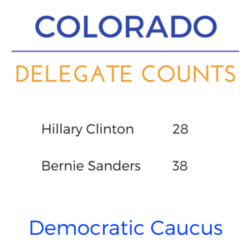 | Bernie Sanders won the 2016 Colorado Democratic caucus. Barack Obama won the 2008 Colorado Democratic caucus with 67 percent of the vote. In 2008, Hillary Clinton came in second with 32 percent. In 2016, Clinton came in second with 40 percent. A Quinnipiac University poll conducted in Colorado in November 2015 showed Clinton leading the Democratic field with 55 percent. The same poll found that Clinton had the lowest favorability rating of any top candidate in Colorado, although she was rated highest for having the right experience to be president. |
In Colorado, Republican precinct caucuses were also held on March 1. The state GOP decided not to conduct a presidential straw poll. Colorado Republican National Convention delegates will be chosen at party gatherings and the Colorado state GOP convention on April 8 and 9.
Georgia
| Presidential primary | |
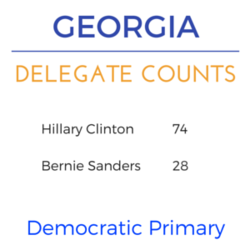 | Hillary Clinton won the 2016 Georgia Democratic primary with 71.2 percent of the vote. This was a substantial improvement over her 2008 performance against Barack Obama, where she only won 31.1 percent. Clinton also swept the state except for one county; Bernie Sanders claimed that victory in Echols County.
According to exit polling from CNN, Clinton won with nearly every demographic group, including men, women, self-identified liberals and moderates, and voters of all income and education levels. Eighty-five percent of African-American voters supported Clinton. Sanders narrowly outperformed with voters 29 years of age or younger and with white men. |
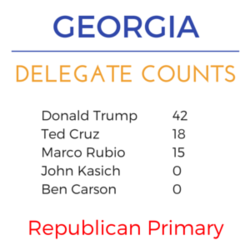 | Donald Trump won the 2016 Georgia Republican primary with nearly 39 percent of the vote. Marco Rubio and Ted Cruz followed with 24.5 percent and 23.6 percent, respectively. According to NBC News, Trump and his allies spent less than $100,000 in the state. This was significantly less than the $1.6 million pro-Cruz forces spent in Georgia.
Nevertheless, Trump managed to win with a wide range of demographic groups, including men, women, voters of all ages, high school and college graduates, and voters who identified as somewhat conservative or moderate. Rubio outperformed Trump with voters who had incomes of $100,000 or more and voters with a postgraduate education. He also won with non-white voters. |
Massachusetts
| Presidential primary | |
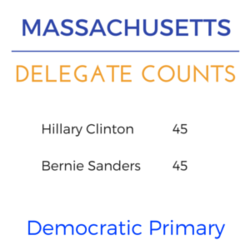 | Hillary Clinton won the 2016 Massachusetts Democratic primary. With 97 percent of precincts reporting, Clinton narrowly defeated Bernie Sanders, 50.3 percent to 48.5 percent. This was a hard-fought victory for Clinton, as Sanders outspent her in the state with $1.35 million in television and radio advertising buys. Clinton spent less than half that amount: $547,000. According to exit polls from CNN, Clinton won with women, voters 30 years of age or older, and college graduates. Sanders won 65 percent of voters younger than 29 years of age and 72 percent of first-time voters. |
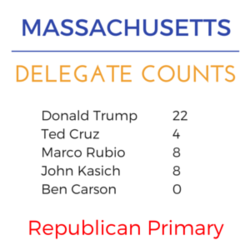 | Donald Trump won the 2016 Massachusetts Republican primary. With 49 percent of the vote, Trump registered more support than his four rivals combined. John Kasich placed a surprising second in the state with 18.1 percent. Rubio followed closely behind in third with 17.9 percent. Exit polling from CNN showed Trump winning across nearly every demographic group, including men, women, voters of all ages and education levels, and self-identified conservatives and moderates. Among voters who indicated that "shares my values" was their top candidate quality, Kasich won. |
Minnesota
| Presidential election | |
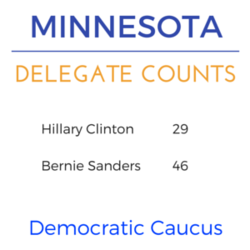 | Bernie Sanders won the 2016 Minnesota Democratic caucuses. With 86 percent of precincts reporting, Sanders won every congressional district. Although polls leading up to the caucuses favored Hillary Clinton, she was unable to secure a win in the state, repeating her loss in 2008 to Barack Obama. |
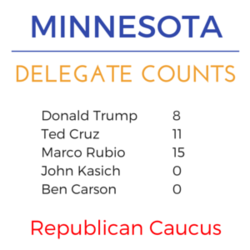 | Marco Rubio won the 2016 Minnesota Republican caucuses. This victory marked Rubio's first primary election win, an important accomplishment on a night where rivals Donald Trump and Ted Cruz picked up seven states and three states, respectively. Rubio's success may have been bolstered by an endorsement from Minnesota's largest newspaper, The Minneapolis Star Tribune. |
Oklahoma
| Presidential primary | |
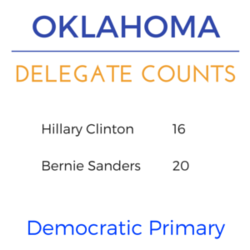 | Bernie Sanders won the Oklahoma Democratic primary with 51.9 percent. Hillary Clinton was unable to re-create her 2008 win over Barack Obama in Oklahoma, losing to Sanders by approximately 10 points. According to exit polls from CNN, Sanders outperformed Clinton with men, voters 44 years of age or younger, and voters with incomes ranging from $30,000 to $200,000. He won 73 percent of first-time voters. Clinton outperformed Sanders with African-Americans, voters with postgraduate education, voters with incomes over $200,000 and voters who identified themselves as moderates. |
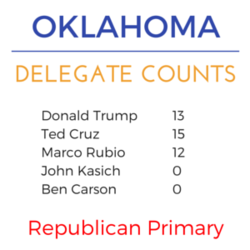 | Ted Cruz won the Oklahoma Republican primary with 34.4 percent. Although Donald Trump was leading in polls of likely Republican voters in Oklahoma the week prior to the primary contest, he registered 6.1 points behind Cruz, with 28.3 percent. Marco Rubio came in third with 26 percent. According to CNN exit polls, Cruz won with men, women, voters of all age groups and self-identified conservatives. |
Tennessee
| Presidential primary | |
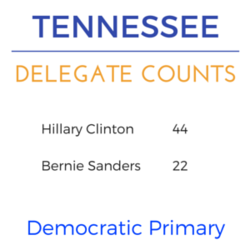 | Hillary Clinton won the Tennessee Democratic primary, defeating Bernie Sanders by more than 30 percentage points. She won all but three counties in the state: Washington, Carter and Unicoi. In Davidson County, home of the city of Nashville, she beat Sanders 65 to 33. Clinton also won the Tennessee Democratic primary in 2008. |
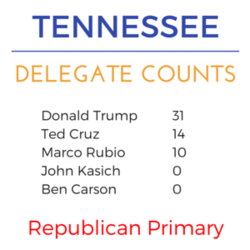 | Donald Trump won the Tennessee Republican primary with nearly 40 percent of the vote. Ted Cruz came in second and Marco Rubio came in third. Trump lost only one county in the state. Rubio beat him 31 to 27 percent in Williamson County. In Davidson County, Trump defeated Rubio by less than 2 percentage points, 31 to 29.3. |
Local
- Local judgeships
- Tennessee held primary elections for local judgeships. Since no Democratic candidates filed to run for any of the partisan offices, only a Republican primary election was held.
- 19th Circuit Court; Part III: Ted Crozier Jr. defeated Roger Nell and Herb Patrick in the Republican primary.
- 19th Circuit Court; Part IV: Incumbent Jill Ayers defeated Robert Bateman in the Republican primary.
- Hamilton County Criminal Court: Incumbent Tom Greenholtz defeated Mike Little and Boyd Patterson in the Republican primary.
- Tennessee held primary elections for local judgeships. Since no Democratic candidates filed to run for any of the partisan offices, only a Republican primary election was held.
- School board elections
- Knox County Schools was the only district of the state’s largest to hold a primary election.
- District 2: Jennifer Owen defeated Grant Standefer.
- District 5: Susan Horn and Reuben "Buddy" Pelot defeated Lori Ann Boudreaux. Neither Horn nor Pelot received more than 50 percent of the vote, so both will advance to the general election on August 4, 2016.
- Knox County Schools was the only district of the state’s largest to hold a primary election.
Texas
| Presidential primary | |
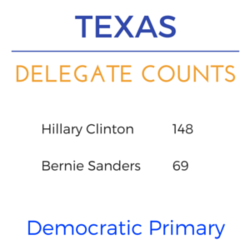 | Hillary Clinton won the Texas Democratic primary election. Polls from late February 2016 showed her with a 30-point lead over her opponent, Bernie Sanders. Exit poll data compiled by CNN shows that Clinton outperformed Sanders with both men and women in Texas, winning 56 percent and 65 percent, respectively. Clinton also won over non-white voters. Latino voters, who made up 28 percent of the Democratic electorate, supported Clinton by 67 percent. She won 80 percent of black voters. |
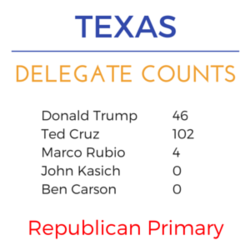 | Ted Cruz won the Texas Republican primary. Cruz was elected as a U.S. senator from Texas in 2012. Donald Trump came in second place. Cruz won almost every major demographic in Texas, including men, women, young and old voters, white and non-white voters, and voters of all education levels. Voters who identified themselves as "very conservative" made up 38 percent of the Republican electorate on March 1, 2016. Of those voters, 54 percent supported Cruz. Trump won 35 percent of voters who viewed themselves as "somewhat conservative" and 40 percent of voters who identified as moderates. |
Congress
U.S. House elections
Only two of the 36 House incumbents in Texas, Ruben Hinojosa (D) and Randy Neugebauer (R), will not seek re-election in 2016.
- District 1
- In what was labeled a primary to watch, incumbent Louie Gohmert (R) easily defeated Simon Winston and Anthony Culler, receiving 82 percent of the vote. Shirley McKellar won the Democratic primary with no opposition.
- District 8
- In another primary to watch, incumbent Kevin Brady (R) narrowly avoided having to compete in a runoff election. He received 53 percent of the vote and defeated challengers Steve Toth, Craig McMichael and Andre Dean. Brady will face no opposition in the general election.
- District 15
- In the race to fill the open seat left by the retirement of Ruben Hinojosa (D), both parties will be forced to hold a runoff election on May 24, 2016. Vicente González and Juan Palacios Jr. advanced to the Democratic runoff with 42 and 19 percent of the vote, respectively. Tim Westley and Ruben Villarreal advanced to the Republican runoff with 45 and 32 percent of the vote, respectively.
- District 18
- Incumbent Sheila Jackson Lee (D) advanced past the primary without opposition. She will face the winner of the Republican primary runoff between Lori Bartley and Reggie Gonzales.
- District 19
- In the race to fill the open seat left by the retirement of Randy Neugebauer (R), Glen Robertson and Jodey Arrington defeated seven other candidates to advance to the Republican primary runoff on May 24, 2016. The race between Robertson and Arrington was very close, with Robertson taking 27.4 percent of the vote to Arrington’s 26.5 percent. The winner of the runoff will face no Democratic opposition in the general election.
- District 23
- Texas' 23rd District has been labeled a battleground in 2016 by Ballotpedia. As expected, both incumbent Will Hurd (R) and challenger Pete Gallego (D) easily won their respective primaries and will face off in November. This will be a rematch of the 2014 race, in which Hurd ousted former incumbent Gallego by a slim 2.1 percent margin.
- District 27
- Incumbent Blake Farenthold (R) defeated challenger Gregg Deeb by a fairly narrow margin of 12 percent. The Democratic primary narrowly avoided a runoff election. Paul "Roy" Barrera won with 50.3 percent of the vote. Ray Madrigal followed with 35.2 percent, and Wayne Raasch trailed with 14.6 percent.
- District 34
- Incumbent Filemon Vela (D) faced no opposition in the Democratic primary. The Republican primary was very close. Rey Gonzalez defeated Willie Vaden with 50.6 percent to Vaden’s 49.4 percent.
State
- Legislature: Sixteen seats in the state Senate and all 150 seats in the state House are up for election in 2016. Republicans hold the House 99-49 and the Senate 20-11. Even if Democrats win every race where they’ve fielded a candidate, they cannot win back control of the chambers. Texas Democrats have not controlled a chamber since 2003; the state has a Republican trifecta.
- A number of primaries featured prominent Republican incumbents facing challengers claiming to be more conservative:
- House District 121: State House Speaker Joe Straus defeated two primary challengers; opponent Jeff Judson secured prominent conservative endorsements.
- House District 115: 2016 was the third contest between incumbent Matt Rinaldi and challenger Bennett Ratliff, who lost in 2014 by 92 votes. Rinaldi defeated Ratliff in the primary.
- House District 99: The Fort Worth Star‑Telegram called the race between incumbent State Rep. Charlie Geren and Bo French "one of the most costly, controversial local races that pits moderate conservatives against movement conservatives."
- Read more of Ballotpedia's Texas primary coverage »
- A number of primaries featured prominent Republican incumbents facing challengers claiming to be more conservative:
- Supreme Court: The three incumbent Texas Supreme Court justices up for re-election faced challengers in the primary election. Democrats haven’t won election to the supreme court since 1992.
- Place 3: Justice Debra Lehrmann, who has served on the state supreme court for six years, faced First Court of Appeals Judge Michael Massengale.
- Place 5: Justice Paul Green, who has served on the court for two terms, faced Rick Green, 45, a lawyer and former member of the Texas House of Representatives.
- Place 9: Justice Eva Guzman, who was elected in 2010, faced Joe Pool, a lawyer.
Local
Texas held primary elections for local judgeships. A total of 259 district court judgeships and 36 county court judgeships are up for general election on November 8, 2016. The primary election featured only those seats where two candidates from the same political party filed for the same judgeship. Of the 295 judgeships up for election, only 136 feature races with more than a single candidate. Incumbents are running for re-election to 182 seats.
Vermont
| Presidential primary | |
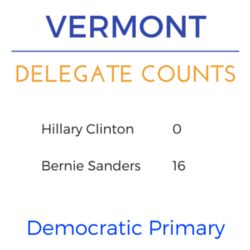 |
Bernie Sanders won Vermont's 2016 Democratic presidential primary. Polls conducted in February 2016 showed that Sanders had overwhelming support in his home state, and it was no surprise that he swept the state’s Democratic presidential primary on Super Tuesday. In a poll conducted by Public Policy Polling February 14-16, 2016, 86 percent of participants supported Sanders, the state’s junior senator. Hillary Clinton polled at 10 percent. A Castleton University poll conducted February 3-17, 2016, showed Sanders with 83 percent support and Clinton with 9 percent.
|
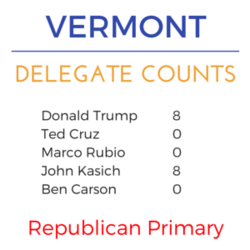 | Donald Trump won Vermont's Republican primary. John Kasich finished a close second. A Vermont Public Radio poll released on February 22, 2016, showed Donald Trump leading with 33 percent and Marco Rubio and John Kasich tied for second with 14 percent each. Kasich made a late push in Vermont when he held a town hall in Colchester, Vermont, on Saturday while Republican primary voters cast ballots in South Carolina. Republican primary exit polls show that Trump won 34 percent of men and 31 percent of women; Kasich had the support of 32 percent of men and 30 percent of women. At 30 percent, Marco Rubio had the most support among voters in the 17-44 age bracket. Trump won 34 percent of voters 45 and over. |
Virginia
| Presidential primary | |
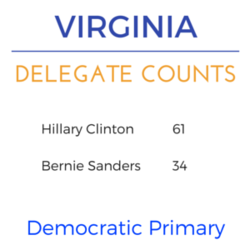 | Hillary Clinton won the Virginia Democratic primaries, defeating opponent Bernie Sanders by almost 30 percentage points. Multiple news outlets called the election in her favor shortly after polls closed at 7:00 pm EST. Clinton lost the Virginia Democratic primary in 2008 to Barack Obama. Similar to her victory in South Carolina on February 27, 2016, Clinton received support from numerous major demographics in Virginia. According to CNN exit poll data, she outperformed Sanders with men, women, voters 45 years of age or older, voters with educational backgrounds ranging from no high school degree to post-graduates, and voters with annual incomes ranging from $30,000 or less to $200,000 or more. Clinton also won 82 percent of African-American voters. Sanders, on the other hand, outperformed Clinton with younger voters, first-time voters, white males and voters who identified as independents. |
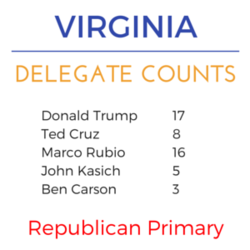 | Donald Trump won the Virginia Republican primaries. Marco Rubio and Ted Cruz came in second and third place, respectively. Exit poll data shows that Trump outperformed Rubio with men, older voters, voters without college degrees and voters with incomes below $100,000. Rubio won with women, younger voters, voters with college degrees and voters with incomes higher than $100,000. White voters, according to CNN exit poll data, made up 86 percent of the Republican electorate in Virginia on March 1. Trump won 35 percent of white voters. Rubio won 31 percent. Non-white voters made up 14 percent of the electorate. Rubio won 34 percent of non-white voters, while Trump won 30 percent. |
Wyoming
The Wyoming Republican precinct caucuses concluded on March 1. (But unlike Iowa, there was no presidential straw poll at this first stage in the Republican process.) Those precinct caucuses elected delegates to attend county conventions on March 12, where some of the state’s Republican National Convention delegates and alternates will be chosen. The rest of the state’s national convention delegation will be chosen at the Wyoming Republican Party state convention on April 16.
Sign-up to receive The Tap, Ballotpedia's weekly newsletter on federal, state, and local politics and public policy, in your email inbox every Monday.


